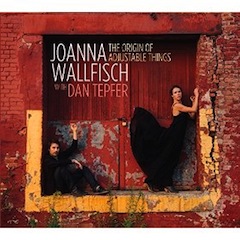
Dan Tepfer and Joanna Wallfisch: ‘The songs seem to follow an emotional arc, one that is not really up but in which you sense the performer working her way through an intense emotional relationship.’

THE ORIGIN OF ADJUSTABLE THINGS
Joanna Wallfisch with Dan Tepfer
Sunnyside
I suppose that, if you want to pigeonhole things, Joanna Wallfisch is a jazz singer and composer but her style bring all sorts of other influences to bear on this album. The Origin of Adjustable Things has much to attract and intrigue anyone interested in fine performance. Wallfisch is joined by keyboard player Dan Tepfer and most of the tracks feature Wallfisch’s vocals and Tepfer’s accompaniments on piano, mellotron, wurlitzer and pump organ. The majority of songs are by Wallfisch herself, both music and lyrics, but there are some covers of songs by the likes of Radiohead (“Creep”), Dimitri Tiomkin (“Wild Is the Wind,” co-write with Ned Washington), Jay Livingston and Ray Evans (“Never Let Me Go”)
Joanna Wallfisch comes from a musical family (she is the only daughter of cellist Raphael and violinist Elizabeth “Libby” Wallfisch, and her cellist grandmother, Anita Lasker-Wallfisch, now 88, avoided the Auschwitz gas chamber only because she was a member of the Nazi concentration camp’s Women’s Orchestra) and studied Jazz Performance at the Guildhall School of Music and Drama and is now based in New York. Her accompanist, Dan Tepfer, was born in Paris to American parents.
Joanna Wallfisch and Dan Tepfer, ‘Never Let Me Go’ (by Jay Livingston and Ray Evans). The studio version concludes the album The Origin of Adjustable Thngs.
The main focus of the album is the voice/piano duo of Wallfisch and Tepfer, though Tepfer veers into other keyboards to provide a variety of timbres and some electronic effects as well, which, though discreet, rather startle at first. Wallfisch layers backing vocals on songs like “Satellite,” and on “Brighton Beach” Wallfisch herself plays piano whilst Tepfer plays pump organ. But the combination of just voice and piano gives the album a stripped down quality; it concentrates on the basics and, in terms of the songwriting, means that there is nowhere else to go. We cannot be distracted by glorious instrumental riffs; we are concentrating on the songs themselves.
Wallfisch’s style is pleasingly plangent and most of the items on the disc have a touchingly mournful quality. She reminded me of generation of female singer/songwriters from my younger days, with singers like Joni Mitchell being called to mind. There is however the danger of a certain sameness coming over the songs with their exploring similar emotional palates. But these are finely written songs; Jazz yes, but highly crafted. Her lyrics have a similar quirkiness, and particularly eschew easy rhymes and meters, they never fall into easy patterns and always intrigue and trick the ear. I must admit that, though I enjoyed the disc, on repeated listening I was troubled more by the feeling that the music never comes out and grabs you. The songs respond to intent listening, but it is easy to let them slip into the background.
https://www.youtube.com/watch?v=uHJR8lPFlpA
At Rockwood Music Hall in New York City, Joanna Wallfisch with Dan Tepfer (piano), Chris Tordini (bass) and James Shipp (percussion) performs her original song ‘This Is How You Make Me Feel,’ as featured on the album The Origin of Adjustable Things.
I think that one of the reasons why I enjoyed this disc was that Wallfisch’s writing brings in all sorts of other influences which might not appeal to those wanting a purer jazz style but which makes me love them. I loved the sheer clarity of this music and Wallfisch’s performance. She does not stretch and bend pitch and rhythm in the manner of some jazz singers; again we come back to the fact that it the songs, the music that is important. The songs seem to follow an emotional arc, one that is not really up but in which you sense the performer working her way through an intense emotional relationship. Everything ends with a hauntingly intense version of Livingston & Evans’s “Never Let Me Go.”
The disc comes with minimal packaging, but the CD itself contains a handsome digital booklet with notes on the songs by Wallfisch as well as all the lyrics (not that you need them, as her diction is superb).
![]()
Posted at Planet Hugill–A World of Classical Music on February 17, 2015 and reprinted by permission of the author. Visit Planet Hugill for classical music news, reviews, interviews and musings from contemporary music by composer Robert Hugill.



